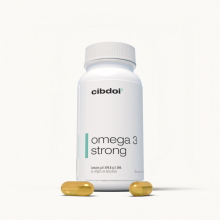Does Fish Oil Reduce Inflammation?
Published:
Inflammation is a natural process that helps the body heal from injury, infection, and disease. Short-term inflammation is beneficial, but chronic inflammation can lead to various health problems. The omega-3 fatty acids in fish oil have powerful anti-inflammatory properties that can help reduce unwanted inflammation.
Contents:
- How Fish Oil Combats Inflammation
- Conditions Improved by Fish Oil's Anti-Inflammatory Effects
- How Much Fish Oil is Needed for Anti-Inflammatory Benefits?
- Food Sources of Anti-Inflammatory Omega-3s
-
Answers to Common Fish Oil Questions
- Q: How long does it take for fish oil to reduce inflammation?
- Q: Does fish oil reduce joint inflammation and arthritis faster than medications?
- Q: If I’m vegetarian/vegan, can I still get anti-inflammatory benefits from plant-based omega-3s?
- Q: Can I give fish oil to my child to reduce inflammation?
- Q: Does cooking/storing fish oil make it less effective for inflammation?
- The Bottom Line

How Fish Oil Combats Inflammation
Fish oil contains high amounts of the omega-3 fats eicosapentaenoic acid (EPA) and docosahexaenoic acid (DHA). Studies show EPA and DHA can reduce inflammatory markers like:
C-Reactive Protein
C-reactive protein (CRP) is a sensitive marker of systemic inflammation. Multiple studies demonstrate fish oil supplementation decreases CRP levels in healthy adults and those with inflammatory conditions.
Cytokines
Cytokines are small proteins released by immune cells that control inflammatory responses. EPA and DHA have been shown to inhibit the production of several pro-inflammatory cytokines.
Cellular Inflammation
Fish oil supplementation can reduce the number of circulating pro-inflammatory immune cells and inflammatory signaling molecules in the body.
Conditions Improved by Fish Oil's Anti-Inflammatory Effects
The anti-inflammatory properties of fish oil may benefit several health conditions associated with chronic inflammation:
Arthritis
Patients with rheumatoid arthritis who take omega-3 supplements often experience reduced joint swelling, morning stiffness, and pain. Fish oil may also allow arthritis patients to decrease use of anti-inflammatory medications.
Metabolic Disease
Chronic inflammation contributes to insulin resistance, obesity, and atherosclerosis. The anti-inflammatory effects of fish oil help improve biomarkers associated with metabolic syndrome.
Inflammatory Bowel Diseases
Supplementing with fish oil can help reduce symptoms of Crohn’s disease and ulcerative colitis, the two main types of inflammatory bowel diseases.
Asthma
Fish oil has been shown to improve lung function and reduce asthma symptoms due to its anti-inflammatory effects. It may allow some patients to reduce steroid medications.
Autoimmune Diseases
The anti-inflammatory effects of omega-3s may help improve symptoms of certain autoimmune conditions like lupus, psoriasis, and multiple sclerosis.
Mental Health Disorders
Patients with major depression have higher levels of inflammation. Omega-3 supplements may have therapeutic effects by inhibiting pro-inflammatory cytokines that can negatively impact mood and behavior.
How Much Fish Oil is Needed for Anti-Inflammatory Benefits?
Eating omega-3 rich fish can provide some anti-inflammatory effects. However, studies show taking fish oil supplements in doses of 1000-4000 mg per day provides the most potent anti-inflammatory benefits.
The optimal dosage depends on your health goals:
- General health: 1000 mg EPA/DHA daily
- Heart health: 2000 mg EPA/DHA daily
- Autoimmune disease: 3000 mg EPA/DHA daily
- Inflammatory arthritis: 3000-5000 mg EPA/DHA daily
Talk to your doctor to find the right fish oil dosage for you based on your specific health conditions and goals.
Anti-Inflammatory Mechanisms of Fish Oil
Research shows omega-3 fatty acids from fish oil reduce inflammation through several mechanisms:
1. Inhibiting Eicosanoids
Eicosanoids are signaling molecules made from omega-6 fats that promote inflammation. EPA and DHA inhibit the production of inflammatory eicosanoids like leukotriene B4.
2. Cytokine Suppression
Omega-3s block the synthesis of pro-inflammatory cytokines like interleukin-1β, interleukin-6, and tumor necrosis factor alpha (TNF-α).
3. Resolvin Production
EPA and DHA are converted into specialized pro-resolving mediators called resolvins that actively resolve inflammation and promote tissue healing.
4. Oxidative Stress Reduction
Fish oil has antioxidant effects that suppress the oxidative stress driving chronic inflammatory conditions.
Is Krill Oil or Regular Fish Oil Better for Inflammation?
Both krill oil and regular fish oil supplements provide anti-inflammatory benefits, but there are some key differences:
- Krill oil contains EPA and DHA bound to phospholipids, which may improve bioavailability
- Fish oil provides more total EPA/DHA at a lower cost
- Krill oil also provides the antioxidant astaxanthin
Krill oil shows promise for arthritis at lower doses compared to fish oil. For other conditions, regular fish oil supplements are recommended for their higher omega-3 content by weight.
Food Sources of Anti-Inflammatory Omega-3s
The richest dietary sources of anti-inflammatory EPA and DHA are:
- Salmon
- Mackerel
- Sardines
- Anchovies
- Herring
- Trout
- Oysters
- Tuna
- Whitefish
Aim for at least two servings (6 ounces) per week of these fatty fish. ALA found in plant foods like walnuts, flaxseeds, and chia seeds can convert to EPA/DHA but the conversion is inefficient.
Should I Take Fish Oil with Anti-Inflammatory Medications?
Fish oil is safe to take with most medications. However, check with your doctor before combining fish oil with blood thinners as it may increase bleeding risk. Fish oil may allow some patients to lower doses of anti-inflammatory medications, but this should be supervised by a doctor.
Answers to Common Fish Oil Questions
Below are answers to some frequently asked questions about fish oil and inflammation:
Q: How long does it take for fish oil to reduce inflammation?
It may take 2-3 months of regular fish oil supplementation to see significant reductions in inflammatory markers. Effects are dose-dependent, with higher doses providing faster relief.
Q: Does fish oil reduce joint inflammation and arthritis faster than medications?
While fish oil has anti-inflammatory effects, prescription medications like NSAIDs and biologics are still more potent and fast-acting for severe arthritis. However, fish oil supplements may allow patients to lower their medication dosages over time.
Q: If I’m vegetarian/vegan, can I still get anti-inflammatory benefits from plant-based omega-3s?
You can obtain some anti-inflammatory benefits from the plant-based omega-3 ALA in vegan foods like walnuts, flax, and chia. However, because the conversion to EPA/DHA is limited, algal oil supplements are recommended for vegetarians and vegans to get pre-formed, highly anti-inflammatory omega-3s.
Q: Can I give fish oil to my child to reduce inflammation?
Fish oil supplements are safe for children and provide anti-inflammatory effects that may help conditions like juvenile arthritis, asthma, and inflammatory bowel diseases. Always discuss appropriate dosing with your child’s doctor. Introduce children to omega-3 rich seafood for long-term health benefits.
Q: Does cooking/storing fish oil make it less effective for inflammation?
Excessive heat, light, and oxygen exposure can damage EPA and DHA in fish oil. Buy a reputable brand in opaque bottles stored in cool, dark conditions for maximum anti-inflammatory benefits. Refrigerating after opening helps maintain freshness.
The Bottom Line
In conclusion, there is substantial scientific evidence demonstrating fish oil’s potent anti-inflammatory properties. The omega-3 fatty acids EPA and DHA found abundantly in fish oil supplements inhibit inflammatory processes through several mechanisms.
Getting enough omega-3s from fish oil or seafood may help prevent or treat various chronic inflammatory conditions and their related health complications. Talk to your doctor to see if fish oil supplementation is appropriate for your individual health status and goals.










